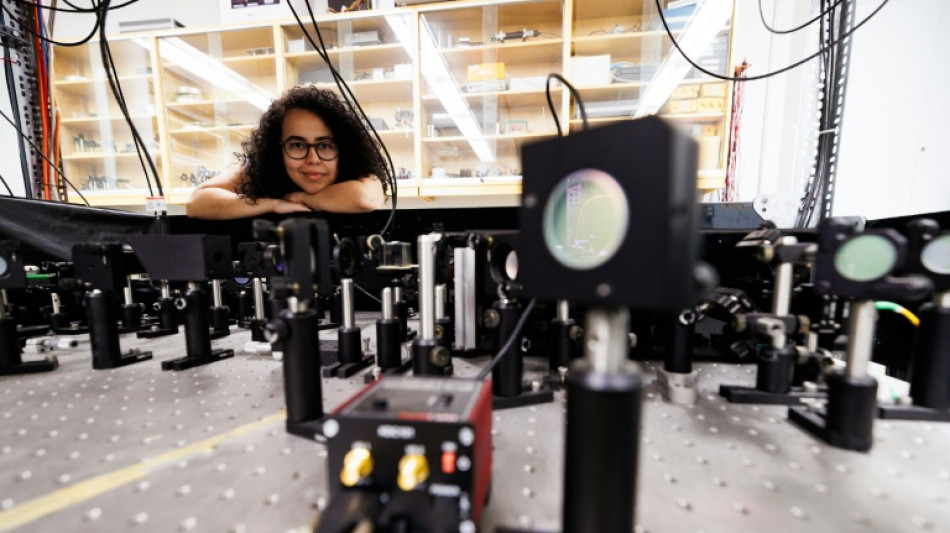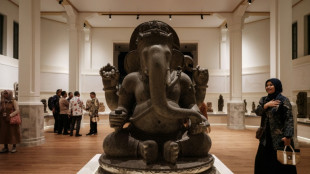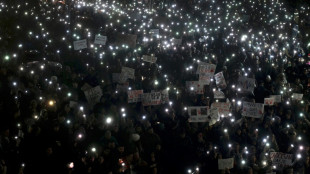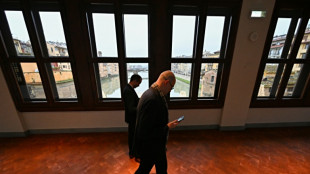
-
 Cavaliers cruise past Bucks, Embiid shines in Sixers win
Cavaliers cruise past Bucks, Embiid shines in Sixers win
-
US President Biden authorizes $571 million in military aid to Taiwan

-
 Arahmaiani: the Indonesian artist with a thousand lives
Arahmaiani: the Indonesian artist with a thousand lives
-
Amazon says US strike caused 'no disruptions'

-
 Indonesians embrace return of plundered treasure from the Dutch
Indonesians embrace return of plundered treasure from the Dutch
-
Qualcomm scores key win in licensing dispute with Arm

-
 Scientists observe 'negative time' in quantum experiments
Scientists observe 'negative time' in quantum experiments
-
US approves first drug treatment for sleep apnea

-
 US drops bounty for Syria's new leader after Damascus meeting
US drops bounty for Syria's new leader after Damascus meeting
-
Saudi man arrested after deadly car attack on German Christmas market

-
 'Torn from my side': horror of German Christmas market attack
'Torn from my side': horror of German Christmas market attack
-
US House passes bill to avert shutdown, Senate vote to follow

-
 Bayern Munich rout Leipzig on sombre night in Germany
Bayern Munich rout Leipzig on sombre night in Germany
-
Tiger in family golf event but has 'long way' before PGA return

-
 Wall Street climbs as markets brace for possible govt shutdown
Wall Street climbs as markets brace for possible govt shutdown
-
Pogba wants to 'turn page' after brother sentenced in extortion case

-
 Court rules against El Salvador in controversial abortion case
Court rules against El Salvador in controversial abortion case
-
Reggaeton star Daddy Yankee, wife resolve business dispute

-
 French court hands down heavy sentences in teacher beheading trial
French court hands down heavy sentences in teacher beheading trial
-
Israel army says troops shot Syrian protester in leg

-
 Tien sets-up all-American NextGen semi-final duel
Tien sets-up all-American NextGen semi-final duel
-
Bulked-up Fury promises 'war' in Usyk rematch

-
 Major reshuffle as Trudeau faces party pressure, Trump taunts
Major reshuffle as Trudeau faces party pressure, Trump taunts
-
Reggaeton star Daddy Yankee in court, says wife embezzled $100 mn

-
 Injured Eze out of Palace's clash with Arsenal
Injured Eze out of Palace's clash with Arsenal
-
Norway's Deila named coach of MLS Atlanta United

-
 In Damascus meeting, US drops reward for arrest of Syria's new leader
In Damascus meeting, US drops reward for arrest of Syria's new leader
-
Inter-American Court rules Colombia drilling violated native rights

-
 Amazon expects no disruptions as US strike goes into 2nd day
Amazon expects no disruptions as US strike goes into 2nd day
-
Man Utd 'more in control' under Amorim says Iraola

-
 Emery insists Guardiola 'still the best' despite Man City slump
Emery insists Guardiola 'still the best' despite Man City slump
-
US confirms billions in chips funds to Samsung, Texas Instruments

-
 English Rugby Football Union chairman quits amid pay row
English Rugby Football Union chairman quits amid pay row
-
Wall Street rebounds despite US inflation ticking higher

-
 Major reshuffle as Trudeau faces party pressure, Trump attacks
Major reshuffle as Trudeau faces party pressure, Trump attacks
-
Serbia schools to shut amid new protests over station collapse

-
 Serbia schools shut amid new protests over station collapse
Serbia schools shut amid new protests over station collapse
-
Gatland remains as Wales boss but must 'change fortunes on the pitch'

-
 Argentina's dollar craze cools under greenback-loving Milei
Argentina's dollar craze cools under greenback-loving Milei
-
Medici secret passageway in Florence reopens after refit

-
 Anger after Musk backs German far right
Anger after Musk backs German far right
-
Arteta says 'best is yet to come' as he marks five years at Arsenal

-
 Pereira happy to achieve Premier League 'target' with Wolves
Pereira happy to achieve Premier League 'target' with Wolves
-
'Dark lull' in German energy transition sparks political debate

-
 Russian skaters allowed to compete as neutrals in 2026 Winter Olympics
Russian skaters allowed to compete as neutrals in 2026 Winter Olympics
-
Russian missile barrage on Kyiv kills one, damages embassies

-
 No longer Assad's mouthpiece, Syrian media face uncertainty
No longer Assad's mouthpiece, Syrian media face uncertainty
-
US diplomats meet with Syria's new ruler

-
 EU, Swiss hail 'historic' new deal resetting relations
EU, Swiss hail 'historic' new deal resetting relations
-
Stocks retreat as US inflation ticks higher


Scientists observe 'negative time' in quantum experiments
Scientists have long known that light can sometimes appear to exit a material before entering it -- an effect dismissed as an illusion caused by how waves are distorted by matter.
Now, researchers at the University of Toronto, through innovative quantum experiments, say they have demonstrated that "negative time" isn't just a theoretical idea -- it exists in a tangible, physical sense, deserving closer scrutiny.
The findings, yet to be published in a peer-reviewed journal, have attracted both global attention and skepticism.
The researchers emphasize that these perplexing results highlight a peculiar quirk of quantum mechanics rather than a radical shift in our understanding of time.
"This is tough stuff, even for us to talk about with other physicists. We get misunderstood all the time," said Aephraim Steinberg, a University of Toronto professor specializing in experimental quantum physics.
While the term "negative time" might sound like a concept lifted from science fiction, Steinberg defends its use, hoping it will spark deeper discussions about the mysteries of quantum physics.
- Laser experiments -
Years ago, the team began exploring interactions between light and matter.
When light particles, or photons, pass through atoms, some are absorbed by the atoms and later re-emitted. This interaction changes the atoms, temporarily putting them in a higher-energy or "excited" state before they return to normal.
In research led by Daniela Angulo, the team set out to measure how long these atoms stayed in their excited state. "That time turned out to be negative," Steinberg explained -- meaning a duration less than zero.
To visualize this concept, imagine cars entering a tunnel: before the experiment, physicists recognized that while the average entry time for a thousand cars might be, for example, noon, the first cars could exit a little sooner, say 11:59 am. This result was previously dismissed as meaningless.
What Angulo and colleagues demonstrated was akin to measuring carbon monoxide levels in the tunnel after the first few cars emerged and finding that the readings had a minus sign in front of them.
- Relativity intact -
The experiments, conducted in a cluttered basement laboratory bristling with wires and aluminum-wrapped devices, took over two years to optimize. The lasers used had to be carefully calibrated to avoid distorting the results.
Still, Steinberg and Angulo are quick to clarify: no one is claiming time travel is a possibility. "We don't want to say anything traveled backward in time," Steinberg said. "That's a misinterpretation."
The explanation lies in quantum mechanics, where particles like photons behave in fuzzy, probabilistic ways rather than following strict rules.
Instead of adhering to a fixed timeline for absorption and re-emission, these interactions occur across a spectrum of possible durations -- some of which defy everyday intuition.
Critically, the researchers say, this doesn't violate Einstein's theory of special relativity, which dictates that nothing can travel faster than light. These photons carried no information, sidestepping any cosmic speed limits.
- A divisive discovery -
The concept of "negative time" has drawn both fascination and skepticism, particularly from prominent voices in the scientific community.
German theoretical physicist Sabine Hossenfelder, for one, criticized the work in a YouTube video viewed by over 250,000 people, noting, "The negative time in this experiment has nothing to do with the passage of time -- it's just a way to describe how photons travel through a medium and how their phases shift."
Angulo and Steinberg pushed back, arguing that their research addresses crucial gaps in understanding why light doesn’t always travel at a constant speed.
Steinberg acknowledged the controversy surrounding their paper's provocative headline but pointed out that no serious scientist has challenged the experimental results.
"We've made our choice about what we think is a fruitful way to describe the results," he said, adding that while practical applications remain elusive, the findings open new avenues for exploring quantum phenomena.
"I'll be honest, I don’t currently have a path from what we've been looking at toward applications," he admitted. "We're going to keep thinking about it, but I don't want to get people's hopes up."
M.White--AT



